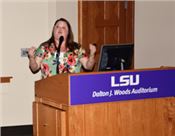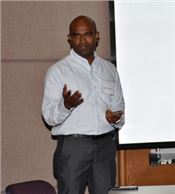|
LSU AgCenter Experts Discuss Water Issues At Conference
BATON ROUGE, LA.
Water experts from the LSU AgCenter and other institutions across the South presented their latest research findings at the 12th annual Louisiana Water Conference, which was held on the LSU campus March 27 to 28.
Topics ranged from freshwater flow impacts to estuaries to voluntary programs addressing nonpoint source pollution.
Doug Carlson, assistant professor of research with the Louisiana Geological Survey, said this annual meeting is designed to present and deliver water information.
“We want to have an exchange of information among different people involved with water resources,” Carlson said. “We bring together a number of different people, including agriculture, engineering and geosciences.”
AgCenter irrigation engineer Stacia Davis discussed an irrigation scheduling aid called Smart Technologies for Agricultural Management and Production (STAMP).
Davis explained how water is used at the farm level and how it can be improved through the use of tools like STAMP.
“When I was hired about four years ago, farmers were interested in water sensors to see how much water they needed,” she said. “But since using the sensors can be very expensive, I decided it would be more feasible to use weather conditions to determine when you need to irrigate.”
Davis said her objective is to develop a scheduling tool that a farmer can easily use. She explained that she is only interested in the top 3 feet of soil because this is where crop roots are located.
Though she is still in the evaluation phase of her research model, she said she wants to compare the sensor readings with her data.
While irrigation helps improve crop yields, it can also cause runoff of valuable soil nutrients, which cost farmers and the environment in the long run, she said.
AgCenter economist Naveen Adusumilli presented information on the characteristics of voluntary programs addressing non-point source pollution.
This type of pollution occurs when rainfall or irrigation water runs over lands or through the soil, picks up pollutants and deposits them into bayous, rivers, lakes, coastal waters and groundwater.
AgCenter entomologist Madeline Gill presented information on damage to Roseau cane in Louisiana’s coastal areas. Gill is trying to determine whether a scale insect is causing the die-off.
“The loss of the cane leaves the coast vulnerable to erosion in case of hurricanes,” she said. “We are also studying the scale to see if it is affecting other plants.”
Two types of scale are found in the cane in Louisiana: the native scale and an invasive scale that was discovered in Plaquemines Parish in the fall of 2016.
In addition to researchers from the AgCenter, presenters at the conference came from LSU, the Water Institute of the Gulf, the University of Louisiana at Lafayette, McNeese State University, Tulane University, the United States Geological Survey, Sichuan University in China and Texas A&M University. ∆

LSU AgCenter irrigation engineer Stacia Davis discusses one of her aids in irrigation
scheduling called Smart Technologies for Agricultural Management and Production
(STAMP) during the 12th annual Louisiana Water Conference.
Photos by Johnny Morgan/LSU AgCenter

LSU AgCenter economist Naveen Adusumilli presents information on the characteristics
of voluntary programs addressing non-point source pollution at the 12th annual Louisiana
Water Conference.
|
|